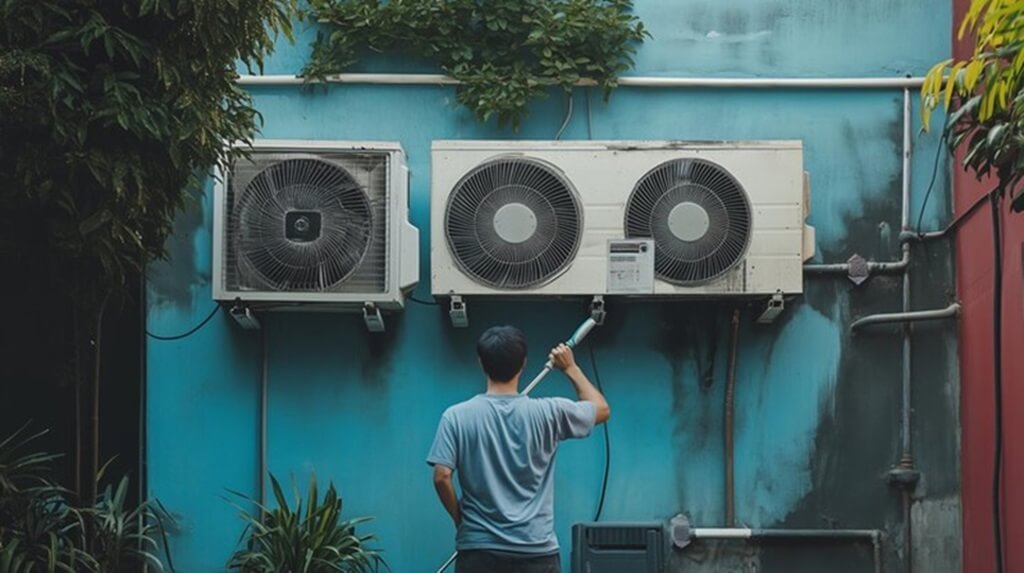This is a question many homeowners find themselves asking when unexpected noises disrupt their comfort. A quiet and efficient air conditioning system is vital for maintaining a peaceful home environment. Unusual sounds from your AC unit can be both annoying and indicative of underlying issues that need immediate attention.
In this article, we explore the common reasons why your air conditioning might be so loud and provide insights on how to address these problems effectively.
Table of Contents
Common AC Noises and Their Possible Causes
| Type of Noise | Possible Causes |
| Banging or Clanking | Loose or broken parts |
| Hissing or Whistling | Refrigerant leaks or duct issues |
| Grinding or Screeching | Faulty motor bearings or worn-out components |
| Buzzing or Humming | Electrical issues or loose wiring |
| Rattling | Debris in the unit or loose panels |
| Squealing | Worn belts or motor issues |

Common Reasons Why Is My Air Conditioning So Loud
Many homeowners wonder, why is my AC unit so loud. The reasons can range from simple maintenance issues to more complex mechanical problems.
Loose or Unsecured Parts
Over time, the constant vibrations of your air conditioning system can cause screws, bolts, and other components to loosen. These loose parts can create rattling or banging noises as the unit operates. Addressing this issue promptly can prevent more significant damage and keep your AC running smoothly.
Dirty or Clogged Filters
Dirty or clogged filters restrict airflow, forcing your air conditioning unit to work harder than necessary. This strain can lead to increased noise levels, as the system struggles to push air through the obstructions. Regularly replacing or cleaning filters can reduce noise and improve efficiency.
Faulty Fan or Motor
Worn-out bearings or damaged fan blades can cause grinding or screeching sounds. These noises indicate that the fan or motor components are not functioning correctly, which can lead to decreased performance and potential system failure if not addressed.
Refrigerant Leaks
If you hear hissing or whistling noises coming from your AC unit, it may be due to a refrigerant leak. Refrigerant is essential for cooling the air, and leaks not only reduce efficiency but can also be harmful to the environment. It’s crucial to have a professional handle refrigerant issues.
Issues with the Compressor
The compressor is an essential component of your air conditioning system. Loud banging or humming noises can signal a failing compressor, which may require repair or replacement. A faulty compressor can lead to insufficient cooling and increased energy costs.
Ductwork Problems
Rattling or whistling sounds can originate from damaged or poorly installed ductwork. Leaks or gaps in the ducts cause air to escape, leading to noise and reduced efficiency. Sealing or repairing ductwork can resolve these issues.
How to Diagnose Why Your AC Unit Is So Loud?
Identifying the Type of Noise
Understanding the specific noise your AC unit is making can help pinpoint the problem. Buzzing might indicate electrical issues, while rattling could suggest loose parts or debris. Pay close attention to the sounds to assist in diagnosis.
Performing a Visual Inspection
Safely inspect your air conditioning unit for visible signs of wear or damage. Look for loose screws, damaged fan blades, or debris inside the unit. However, always ensure the power is off before inspecting to prevent accidents.
Noting When the Noise Occurs
Observe whether the noise happens during startup, shutdown, or continuous operation. This information can be valuable in determining the cause. For example, noises during startup might indicate motor issues, while constant noise could be due to a worn-out compressor.
Brief Solutions to Fix a Noisy Air Conditioning System
Regular Maintenance and Cleaning
Performing routine maintenance, such as cleaning filters and removing debris from around the unit, can prevent many common noise issues. Regular upkeep ensures your system operates efficiently and quietly.
Tightening and Securing Loose Parts
Using basic tools to tighten screws and secure panels can eliminate rattling and banging noises caused by loose components. This simple fix can significantly reduce unwanted sounds.
Repairing or Replacing Faulty Components
If you identify faulty parts like damaged fan blades or a failing compressor, it’s essential to repair or replace them promptly. Consult a professional technician to handle complex repairs safely.
Preventive Measures to Keep Your AC Unit Quiet
Scheduling Routine Professional Check-Ups
Having a professional inspect your air conditioning system regularly can catch potential problems before they become serious. Routine check-ups help maintain efficiency and extend the lifespan of your unit.
Keeping the Surrounding Area Clean and Clear
Ensure the area around your outdoor unit is free from debris like leaves, twigs, and grass clippings. A clear space prevents foreign objects from entering the unit and causing noise.
Monitoring for Unusual Sounds Regularly
Stay attentive to any new or unusual noises your AC unit makes. Early detection of strange sounds can lead to quick fixes and prevent more significant issues down the line.
We provide the best services for AC repair in Houston, Richmond, Katy & Sugar Land. Call us now at (713) 913-4979.
Summary
In summary, if you’ve been wondering, why is my air conditioning so loud? There are several potential causes, from loose parts to faulty components. Addressing these issues promptly not only restores peace but also enhances the efficiency and longevity of your system. Regular maintenance and being proactive about unusual noises can save you time and money in the long run. Keep your air conditioning unit running smoothly to enjoy a comfortable and serene home environment.

Hello all, my name is Kenny Ho, owner of 75 Degree AC. I had been a helper, installer, technician and HVAC owner for the past 13 plus years. I love to tackle HVAC issues and help customers solve HVAC problems. I believe in fair pricing, quality works and integrity.
